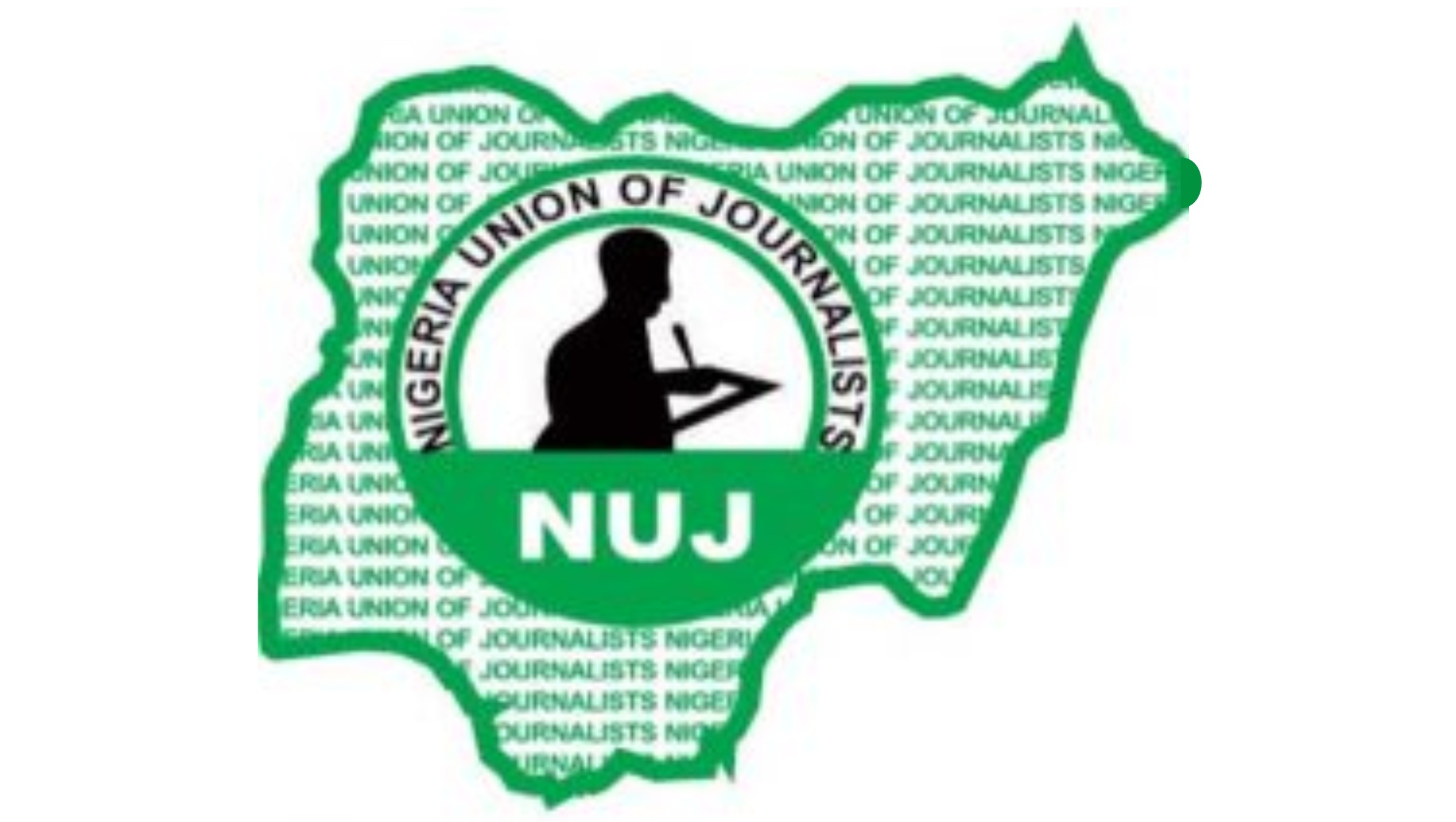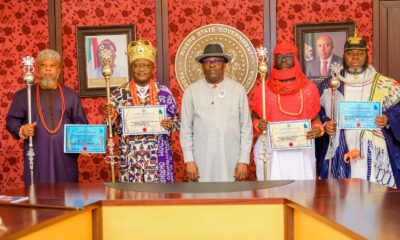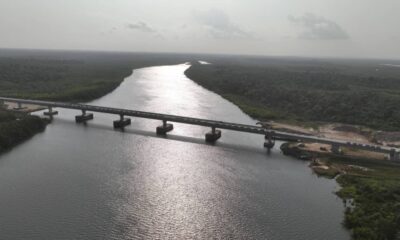News
Disclose Nigeria’s Daily Oil Production, Exports, SERAP Tells NNPCL
The Socio-Economic Rights and Accountability Project (SERAP) has urged the Group Chief Executive Officer, Nigerian National Petroleum Company Limited (NNPCL), Mr Mele Kolo Kyari, to promptly publish details of barrels of oil Nigeria produces and exports every day and the total amounts of revenues generated from oil since the removal of subsidy on petrol in May 2023.
SERAP urged the NNPCL boss to disclose how much of the revenues generated from oil have been remitted to the public treasury since the removal of subsidy on petrol.
The organisation also urged Kyari “to disclose details of payment of N11 trillion as subsidy, and to clarify allegations that the NNPCL has failed to remit revenues generated from oil to the public treasury since the removal of subsidy on petrol.”
This was contained in a letter dated December 9, 2023 and signed by SERAP deputy director Kolawole Oluwadare.
Former Governor of the Central Bank of Nigeria, Sanusi Lamido Sanusi, had last week alleged that the NNPCL is failing to remit enough foreign exchange into the treasury despite the removal of fuel subsidy, asking: “Where is the money?”
SERAP said, “Opacity in the amounts of barrels of oil the country produces and exports daily, the revenues generated and remitted to the public treasury would have negative impacts on the fundamental interests of the citizens and the public interest.
“Transparency would ensure that the revenues are not diverted into private pockets, and increase public trust that the money would be used to benefit Nigerians.”
The letter, read in part, “The public interest in publishing the information sought outweighs any considerations to withhold the information.
“We would be grateful if the recommended measures are taken within 7 days of the receipt and/or publication of this letter.
“If we have not heard from you by then, SERAP shall consider appropriate legal actions to compel the NNPCL to comply with our requests in the public interest.
“SERAP is seriously concerned that years of allegations of corruption and mismanagement in the oil sector and entrenched impunity of perpetrators have undermined public trust and confidence in the NNPCL.
“Ensuring transparency and accountability in the operations of the NNPCL would improve the enjoyment by Nigerians of their right to natural wealth and resources.
“SERAP is concerned that despite the country’s enormous oil wealth, ordinary Nigerians have derived very little benefit from oil money primarily because of widespread grand corruption, and the culture of impunity of perpetrators.
“Combating the corruption epidemic in the oil sector would alleviate poverty, improve access of Nigerians to basic public goods and services, and enhance the ability of the government to meet its human rights and anti-corruption obligations.
“SERAP notes that Section 15(5) of the Nigerian Constitution 1999 (as amended) requires public institutions and officials to abolish all corrupt practices and abuse of power.
“Section 16(2) of the Nigerian Constitution further provides that, ‘the material resources of the nation are harnessed and distributed as best as possible to serve the common good.
“Section 13 of the Nigerian Constitution 1999 imposes clear responsibility on the NNPCL to conform to, observe and apply the provisions of Chapter 2 of the constitution.
“Nigeria has made legally binding commitments under the UN Convention against Corruption and the African Union Convention on Preventing and Combating Corruption to ensure transparency and accountability in the management of public resources.
“Articles 5 and 9 of the UN Convention against Corruption also impose legal obligations on the NNPCL to ensure proper management of public affairs and public funds. These commitments ought to be fully upheld and respected.
“Nigerians are entitled to the right to receive information without any interference or distortion, and the enjoyment of this right should be based on the principle of maximum disclosure, and a presumption that all information is accessible subject only to a narrow system of exceptions.
“By Section 1 (1) of the Freedom of Information (FoI) Act 2011, SERAP is entitled as of right to request for or gain access to information, including information on the details of barrels of oil Nigeria produces and exports every day and the total amounts of revenues generated and remitted to the public treasury.
“The information requested for as indicated above, apart from not being exempted from disclosure under the FoI Act, bothers on an issue of national interest, public concern, the interest of human rights, social justice, good governance, transparency, and accountability.
“The Freedom of Information Act, Section 39 of the Nigerian Constitution, and Article 9 of the African Charter on Human and Peoples’ Rights guarantee to everyone the right to information, including the details of barrels of oil Nigeria produces and exports every day and the total amounts of revenues generated from oil and remitted to the public treasury.
“By the combined reading of the provisions of the Nigerian Constitution, the Freedom of Information Act, and the African Charter on Human and Peoples’ Rights, there are transparency obligations imposed on the NNPCL to widely publish the details sought.
“The Nigerian Constitution, Freedom of Information Act, and the country’s anti-corruption and human rights obligations rest on the principle that citizens should have access to information regarding their public institutions’ activities.
“According to our information, the NNPCL has failed to disclose the amounts of barrels of oil the country produces and exports.
“The NNPCL has also reportedly failed to publish details of revenues generated from the production and exportation of oil and the amounts of revenues remitted to the public treasury as required by Nigerian laws.
“According to the former Governor of the Central Bank of Nigeria, Sanusi Lamido Sanusi, ‘It is only the NNPCL that can give the figures about how much oil we produce daily, how much we sell, and where the money is going. We are no longer paying subsidies so where are the dollars? Where is the money?’
“The NNPCL has a legal responsibility to promote transparency and accountability in barrels of oil the country produces and exports every day, and to ensure that the revenues generated from such production and exportation are dully remitted to the public treasury.
“The NNPLC also has a legal responsibility to disclose details of payment of N11 trillion subsidy.”
News
Work on Eleme Road delaying fuel distribution from PH Refinery – PETROAN
The Petroleum Retail Outlets Owners Association of Nigeria (PETROAN) has expressed concern over the slow pace of work by Reynolds Construction Company (RCC) on the Eleme East-West Road project, Port Harcourt axis.
The National President of PETROAN, Dr Billy Harry, in a statement yesterday, said that the delay was happening in spite of the N33 billion said to have been released by the Federal Ministry of Works, for the project.
Harry decried the challenges the deplorable road posed, saying that it was sabotaging President Bola Tinubu’s efforts to ensure the smooth distribution of petroleum products from the renovated Port Harcourt Refinery.
“Thousands of petroleum trucks will be using the road to convey products from the renovated Port Harcourt refinery, so, further delay is detrimental.
“The Eleme East-West Road is a critical route for the transportation of petroleum products, and its safety is paramount.
“The road’s deplorable condition poses a significant risk to trucks carrying petroleum products, which could lead to catastrophic accidents and environmental disasters.
“PETROAN is calling on the President to evaluate the ongoing contract by RCC in line with the contract timeline.
“This move will consolidate his renewed hope agenda by ensuring the timely completion of the Eleme East-West Road project.”
Harry said that about 60 retail outlets were negatively impacted by the road construction, and requested adequate compensation for owners of the fuel stations.
He recalled that the Minister of Works, David Umahi, in a press conference, had also complained about the slow approach of RCC, leading to the issuance of a seven-day ultimatum by the Minister.
“Furthermore, PETROAN is calling on the Minister of Works, David Umahi, to fast-track the contract evaluation process and take decisive action to address the slow pace of work by RCC.
News
Old Students’ Association Marks Anniversary
The Rivers Secondary Schools Old Boys and Girls 1983 Set Association marked its one year anniversary in Port Harcourt on 22nd December 2024.
The association is a body of old boys and girls of 1983 graduating set of secondary schools in Rivers State, Nigeria conceptualised to provide opportunities for reconnection and reminiscing over old times, networking, creating avenues for personal and professional growth, fostering friendships and celebrating milestones.
The one year anniversary gathering which took place at Galaxy PHD Event Centre, in GRA Phase 2, Port Harcourt, brought together different professionals and was heralded with classic photo shoot session, free speeches and talks on how to move the association to greater heights. It was rounded off with a dinner.
Speaking at the event, the Chairman of the Board of Trustees of the association, Chief Hope Kuku, congratulated members for the one year anniversary.
He encouraged members to reach out to more classmates in order to grow the association as the advantages are enormous in terms of business growth and social interactions.
He said he was already looking forward to a steady growth of the Association to mark the 10th anniversary.
Also speaking, the President of the association, Barrister Tubokumba Harry, described the last one year of the association as “exciting and really fulfilling” promising to “get more of our set mates on board”.
He stated that the coming together as classmates of the same set would inculcate a bond built on shared experiences which can enhance communication skills, promote teamwork and collaboration with lasting memories that members would cherish in the future.
In her own remarks, the Secretary General of the association, Dr (Mrs) Ibinabo Ogolo said one year down the memory lane of the association has been wonderful as members have not only shared experiences but made significant strides towards achieving the aim and objectives of the association.
“We successfully organised programmes like celebrating the Day of the African Child with students of Government Technical College, Trans Amadi, Port Harcourt.
Also, a Road Walk and Health Awareness campaign through Port Harcourt streets to create awareness and sensitize the people of Rivers State on the health importance of walking.
The association also organised a “Hang-Out” session for members on 1st October, 2024 to foster relationships and networking and also joined other groups to relieve stress and depression at the Enjoyment Mega Sit Out at Port Harcourt Club in Port Harcourt.
These activities brought our members and community together”. She said.
On his part, the Chairman of the anniversary planning committee, Mr Tammy Owunaka noted that the association in just one year had grown to enviable height providing a platform for former classmates to reconnect, network and give back to the society.
Furthermore, he stated that the association created opportunities for professional mentorship, developments, and collaboration, thereby helping members to advance in their aspects of endeavour and personal lives.
He said that through the association, members have demonstrated that power of collective action and social responsibility can propel an organisation and commended the sense of belonging and camaraderie among members.
Also speaking, the legal adviser of the association, Barrister Ngozi Ajayi noted that though the association is only one year old, it was already walking on a purposeful path and urged members to remain committed to and focused to make the association one of the best in the state.
In his remarks, Barrister Sylvester Adaka, who is a former Chairman of Nigeria Bar Association, Port Harcourt Branch and a memeber of the association stated that so far the association is on the right path but will progress better with more classmates on board.
He commended the classic photo shoot session as a great way to portray the individual personalities of members, adding that he was looking forward to more events.
News
Nothing’ll Stop Governance In Rivers, Fubara Assures …Says We Won’t Allow Anyone Take State For A Ride

Rivers State Governor, Sir Siminalayi Fubara, has assured that his administration will not leave any stone unturned to checkmate and frustrate anyone or group of persons attempting to stop government from delivering good governance to the good people of the State.
He also assured that with the strong support of the pillars and frontiers of the political class and leaders, particularly those who built the foundational structures of Rivers politics, his administration will not allow any detractor or shenanigan take the State and its people for a ride going forward.
Governor Fubara gave the assurance while addressing Rivers people at a 2025 New Year State Banquet in Government House, Port Harcourt.
He expressed confidence that with the strong organic support of former governors, Dr Peter Odili and Sir Celestine Omehia; former Deputy Speaker, House of Representatives, Sir Austin Opara; former deputy governors, Sir Gabriel Toby and Engr Tele Ikuru; Senators John Azuta-Mbata, Lee Maeba, Andrew Uchendu, Adawari Michael Pepple; former national chairman of PDP, Prince Uche Secondus; former transport minister, Dr Abiye Sekibo; Amb Orji Ngofa; and other former and current elected political office holders and leaders at all levels, with proven integrity and accomplishments, no detractor would stand on the way of the State Government in achieving the giant strides it has set for itself.
The Governor said this year, “We will ensure we protect the integrity of this state, at all cost. We won’t allow anybody take this state for a ride. It doesn’t matter the approach I will use. It’s not going to be a fight. We will follow the issues as we did with the case when they (detractors) started begging. Nothing will stop us from not achieving the purpose of governance in this State.”
With strong confidence and faith in God and the people, the Governor said, “We are not bothered about what they (opposition) will come with. God will always have a way to save us from them. They are going to come, but we are not worried. We are equal to the task. I honestly thank our leaders, from Dr. Peter Odili, Sir Celestine Omehia, Sen John Azuta Mbata, Sir Austin Opara, Prince Uche Secondus, Dr. Abiye Sekibo; to others, for the organic support you are giving to our government.
“A lot of persons would not understand what is really happening. This is not to say we did not have people that were with us and following us and fighting. But one of the troubles they (detractors) have where they are today is that they do not have any (strong) face (in Rivers politics) with them. The beginning and the end of politics in this State is Sir Peter Odili. And if he is sitting with us (here), and with these other persons, who do they have with them?
“This Dr. Odili is the right face and right image of our State. These are the frontiers of Rivers State politics. Men and women that have distinguished themselves are sitting with us (here). People who have contributed in several ways to make Rivers State what it is, not rented people they bring for dinner”, he added.
He recalled that the events of 2024, were a mix bag of daunting challenges, but quickly added that the year ended with his administration scoring more gains than losses, “2024 was not an easy year, but it was great for us in the end. About this time last year, we were not in a very pleasant mood, for fear of what might happen, because of the boasting of those who believe they control life”.
But while boldly projecting the 2025 outlook, the Governor said, “We will continue to put our trust in God as 2024 had been a wonderful year. We had our losses, and our gains. But the most important thing is that our gains surpassed the losses. We can boldly say 2024 was a good year for Rivers State. And year 2025, with your support, we are going to build on the gains of last year.”
He restated his administration’s determination to sustain the Rivers First policy, saying, “We will continue to protect the lives of our people and provide the required services in our State. We are not going to lower our guards. Rather, we will raise our bar because, what is speaking for us today is the achievements we are making in the face of obvious distractions.
“Therefore, raising the bar will be our own way of telling the world that no matter what is happening here, we mean well for the state and know what we are doing. It is not going to be easy. I know. God, at times, keeps evil people to live long to continue their evil, not because He does not know what to do but activities of evil people also keep the righteous people awake,” he stressed.
Governor Fubara commended everyone in the State for their organic support, and solicited for more support in 2025, emphasising, “We are not going to do it alone, because we have not made these gains alone. Whatever win we scored today, it is not myself alone, but the government and the support received from every one of you. I cannot pay you back for doing what is right for your State. It is our State, and at the end of the day, we are building a better future for those to take over after us. That is my own dream for the State.”
The Governor noted that it is not about power and what is done today, but sustaining a system that will be self-preserving, on which everyone can stand and be proud of the State, explaining, “I strongly believe that because of our desire to build, not our (private) supermarkets, or our hotels, but to build a (resilient) State, there is no way we will not succeed, because our interest is not for self, but the collective interest of our people.”
He assured that 2025 is going to be a year of all-round achievements, declaring that by February, 2025, his administration will embark on projects’ commissioning in other sectors, emphasising, “This time around, not roads. Our Fire Service, you can see what we are doing there. For over nine years, there was no functional Fire Service, but today, I can proudly tell you that we have bought all the vehicles, and we are remodelling the offices”.
The Governor added, “Education is the only instrument that can help our youths to avoid criminality and crime. Our State is behind in education, as our primary schools are shadows of themselves. You can see the provisions we made in our budget, and we are making sure education is given the required attention in this State.
“We have done much on health but we are going to spend more because you have to be alive to work. We are doing what we know is right, and doing those things that you can stand anywhere after our administration to defend us that our decisions were right. Nothing will stop us from achieving the purpose of governance in this State”, he vowed.
In his welcome remarks, the Secretary to the State Government, Dr. Tammy Danagogo, noted that the outgone year had been a wonderful one, and commended Governor Siminalayi Fubara, for being focused as an emancipator of the State, saying no matter the antics of the enemies, their acts to distract the government will continue to fail.
While proposing the toast for the New Year, member representing Andoni-Opobo/Nkoro Federal Constituency in the National Assembly, Hon Awaji-Inombek Abiante, said that Governor Fubara’s leadership qualities are a testament to the success of the administration, and prayed for the peace, unity and prosperity of the State, urging the “prodigals” to return home to join in the rebuilding of the Treasure Base of the Nation for future generations.
Highlight of the event was the cutting the New Year Cake by the Governor, who was joined by his Deputy, Prof Ngozi Odu; Speaker, Rivers State House of Assembly, Rt Hon Victor Oko-Jumbo; former governors Peter Odili and Celestine Omehia; Hon Austin Opara; Prince Uche Secondus; retired Justice Mary Odili (JSC); Chief Judge of the State, Justice Chibuzor Simeon Amadi; President, Customary Court of Appeal, Wilfred Ihemnacho Obuzor; Senators John Azuta Mbata, Lee Maeba, Andrew Uchendu, Adawari Pepple; Amb Orji Ngofa; and others.
-
Business4 days ago
Agency Partners Foreign Varsity On Climate-Smart Agriculture Advancement
-

 Nation4 days ago
Nation4 days agoNUJ backs proposed strike by Lagos-owned media workers
-

 Niger Delta4 days ago
Niger Delta4 days agoFouchee Celebrates Asari’s Recognition
-
Niger Delta4 days ago
NDDC Boss Thanks God For Transformation … Promises More Infrastructural Projects
-
Business4 days ago
NACCIMA Rep Urges Farmers To Exploit Hybrid Oil Palm Seedlings
-
News4 days ago
4 Professors, 2 SANs Unveil Book On FUBARAISM …Commend Rivers Gov’s Dev Strides
-

 Rivers4 days ago
Rivers4 days agoJulius Berger reiterates commitment to Bodo- Bonny Road Project
-

 News4 days ago
News4 days agoNothing’ll Stop Governance In Rivers, Fubara Assures …Says We Won’t Allow Anyone Take State For A Ride

